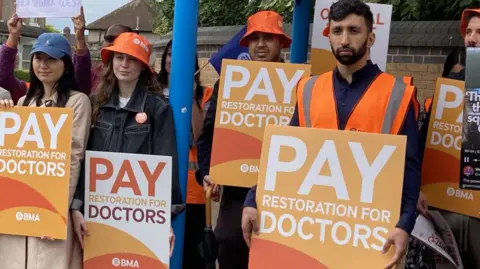The recent conclusion of a five-day doctor strike in England has marked only a temporary pause in ongoing tensions within the National Health Service (NHS). After 12 strikes over several months, medical professionals, particularly junior doctors, continue to express their grievances related to pay and working conditions. Dr. Shivam Sharma, a child and adolescent psychiatry trainee, articulated the frustrations felt by many, noting that trust has waned under the leadership of Health Secretary Wes Streeting. He was among the striking doctors who believed that following Labour’s ascension to power, there would be tangible improvements, including higher pay to reflect the levels from 2008, which would require a 25% increase on top of previous adjustments.
Dr. Sharma reflected on the challenges he faced as a resident doctor, emphasizing the difficulties of constantly rotating through different positions across vast geographic areas, and the strain it has placed on his personal life, often interrupting significant family moments. Moreover, he expressed concern over the escalating costs associated with medical training, particularly citing exam fees that can exceed £1,000, contributing to a financial burden that can total tens of thousands of pounds over their training period.
The British Medical Association (BMA) contends that increasing pay is essential for resolving this strike, but the government remains unyielding, insisting that pay levels cannot be revisited for the current year, with an average increase of 5.4% for resident doctors in 2025-26. This impasse has redirected negotiations toward non-pay issues such as the costs associated with exams, opportunities for career progression, and the frequency of job rotations. Concerns were raised regarding the BMA’s proposed measures, including the forgiving of student loans which can result in debts of approximately £100,000 for medical students, which the government categorically rejected.
The BMA’s willingness to initiate a strike under Labour indicated a determination to push back against what they perceive as inadequate responses to their concerns. Streeting’s criticism of the BMA as reckless was met with assertions from the union regarding their fear of promises that may not be realized. This situation has been exacerbated by both sides accusing each other of jeopardizing patient care, particularly when NHS leaders expressed frustration at the BMA for not permitting doctors to return in a limited capacity to attend to emergencies.
Despite the contentious atmosphere, there are indications that both parties may be willing to revisit negotiations. Senior sources within the BMA have suggested they desire to avoid an ongoing cycle of strikes and talks, a painful pattern seen in the prior Tory government era, which involved numerous strikes in a short period. The notion of creating “breathing space” has surfaced, indicating an interest in meaningful dialogue.
As public sentiment has shifted against the strikes, with recent polling suggesting decreased support for resident doctors, the urgency to find common ground between the BMA and the government has intensified. Streeting’s office emphasizes a desire for resolution, though frustrations linger regarding the BMA’s decision to proceed with strikes instead of pausing negotiations.
Dr. Billy Palmer, from the Nuffield Trust think-tank, acknowledged that while negotiations surrounding pay remain central, issues related to retention and wellbeing are equally critical. He pointed to potential solutions that could alleviate some pressures, including covering out-of-pocket expenses like exam fees and reforming the challenging rota system. In addition, he highlighted the need for temporary relief on student loan repayments until doctors can secure more stable incomes.
The disparities between first-year resident doctors and other related healthcare professionals further complicate matters, suggesting a need for urgent policy revisions. However, whether these measures can effectively resolve the angles of contention in this prolonged dispute remains unclear. With ongoing discussions, there remains a sliver of hope that progress can be made, yet the stakes for both sides remain high.












